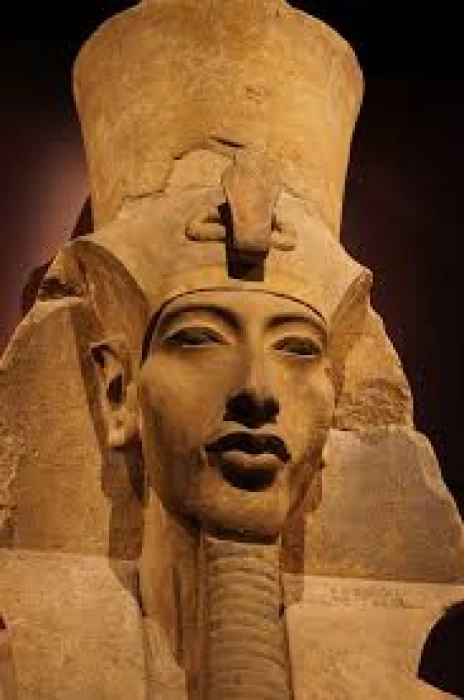
King Akhenaten | Amenhotep IV | Monotheism in Ancient Egypt
Monotheism in Ancient Egypt
The reign of Egypt in this era brought revolutions at all levels of tradition and immediately turned everything over. After that, ancient Egypt underwent a return, for it went back to its normal order of things, and its reign after that king had disappeared or been excluded, while his time and history had ended by stable Egyptian monarchy haters and idols priests from other gods who were wiped out of political landscape once for all in ancient times.
Despite everything, the legacy of the Amarna period did not completely disappear from memory to his contemporaries or even to posterity as those who hated it thought this was the most troublesome and interesting time ever experienced by any nation in all ancient Egypt.
Sun religion was practised by prince Amenhoub (later king Amenhoub IV). He was heavily influenced by hisBrother who used to be one of great Iranians at Sun God temple in the City of Sun: Heliopolis presently known as Ain Shams and Metro areas within eastern cairo governorate. It Should be noted that Aton’s faith had received support from both his grandfather King Tuthmosis IV and father Tuthmosis III but Akhnaton had taken things further with him reaching zeniths as well as concluding this sect.
Akhnatun's State did not last long. Because of the many major catastrophic mistakes that King Akhenaten has tried to make, such as his reluctance to change the cultural identity of the tolerant Egyptian State, which accepts pluralism with distinction as well as his attempt to exclude everything and those against him, as well as the earthquake of the long-standing Egyptian State and neglect of Egypt's foreign policy and important owners in the countries of the old Near East, Only the religious advocacy of his new idol and the artistic, linguistic and literary renovations that did not affect the depth of society and were not accepted by the College.
Among the numerous love stories in ancient Egypt, it is well known that King Akhenaten cherished his wife Nefertiti who was renowned for her beauty, intelligence and inaudible faith on behalf of him. So she became a strong supporter of her husband Akhenaten "IV" during all aspects of life. besides being reinforced by the new cult of unification.
A limestone painting of Akhnaton and Nefertiti worshipping to God come next to their children and going back to the modern state, Amnahdhov IV/Akhnaton (around 1353-1336 BC), the family: 18 was found at Al-Amarneh and displays the painting in the 3 hall of the Egyptian Museum's ground houses, length 8.00 cm, width 48.00 cm, height 52.00 cm.
King Akhenaten (Amenhotep IV) was an ancient Egyptian pharaoh of the 18th dynasty, known for radically transforming religious practices. Reigning from around 1353 to 1336 BCE, he introduced monotheism with the worship of the sun disk, Aten, and moved the capital to Akhetaten (modern-day Amarna). His reforms were largely reversed after his death, but his reign remains a significant and controversial chapter in Egyptian history.
Pharaoh Akhenaten, who ruled the New Kingdom of Egypt during the 18th Dynasty, ruled from 1353 to 1336 BCE. His other names, which all translate to "successful for" or "of great use to" the god Aten, are "Akhnaton," "Akhenatenaton," "Ecnaton," or "Ijnaton."
The Akhenaten attempt ended early. After his death, he ascended to the throne as the young Tutankhamen, who reopened the temples of Amun for worship, brought the capital to Thebes, and changed his name to Tutankhamen instead of the name given by his father, Akhenaten, which was Tutankhaten.
Akhenaten, the first known monotheist, initiated a significant theological, political, and religious revolution lasting 17 years, impacting history throughout his reign.
Of all his reforms, perhaps the most marked was that of elevating Aten, the sun disk, into the place of chief deity. In the first years of his reign, he gradually brought about the transition away from traditional polytheism, which honored the gods Amun, Osiris, and Ra, toward the exclusive worship of Aten. In the fifth year of rule, he reconfirmed his name, adding to it a new one: Akhenaten, which means "Effective for Aten," in honor of his new deity.
Also, Akhenaten changed the capital city from Thebes to a new city he made called Akhetaten (the modern-day Amarna). This city was built with the intention that it would be the center of worship of Aten and the administrative point for the whole of Egypt. This act was the most audacious he did because it was a total cut-off from the very many centuries-old influence of the powerful priestly office of Amun over society in general.














